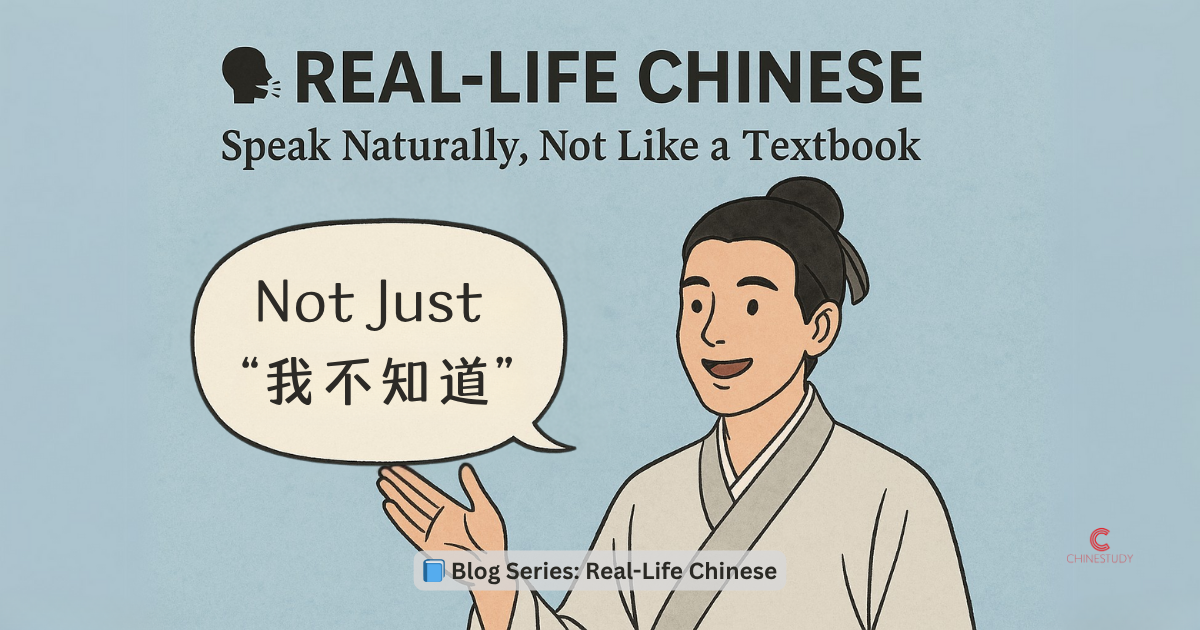🗣️ How to Say “Let’s Wait and See” Naturally in Chinese — Not Just “我不知道”

Want to keep your plans open — but still sound polite in Chinese?
In real Chinese conversations, native speakers don’t usually say “我不知道” (wǒ bù zhīdào) when they want to delay a decision.
They say something softer — and more polite.
🚫 Textbook Chinese
我不知道。
(Wǒ bù zhīdào)
→ I don’t know.
It’s not wrong, but it sounds too cold or uncertain for everyday social talk.
When someone asks about future plans, this might feel like a shutdown.
✅ Real Chinese: Try These Instead
Use these easy phrases that feel natural and friendly:
-
到时候再说吧 (dào shíhou zài shuō ba)
→ “Let’s talk about it then” / “We’ll see when the time comes.”
-
再看看吧 (zài kànkan ba)
→ “Let’s see how things go” / “I’ll take another look later.”
-
看情况吧 (kàn qíngkuàng ba)
→ “Depends on the situation” / “Let’s play it by ear.”
These sound polite, flexible, and easy-going — perfect for social Chinese.
💡When to Use Them
Use these when:
-
🤔 You don’t want to decide now.
-
👥 You want to keep things open but polite.
-
📅 You’re not sure about your schedule or energy.
🧱 Example Sentences
1.
— 你周末有空吗?
(Nǐ zhōumò yǒu kòng ma?)
→ Are you free this weekend?
— 到时候再说吧。
(Dào shíhou zài shuō ba)
→ Let’s talk about it then.
2.
— 你要不要去那个活动?
(Nǐ yào bú yào qù nàge huódòng?)
→ Do you want to go to that event?
— 再看看吧。
(Zài kànkan ba)
→ I’ll see how I feel later.
3.
— 我们什么时候出发?
(Wǒmen shénme shíhou chūfā?)
→ When should we leave?
— 看情况吧。
(Kàn qíngkuàng ba)
→ Let’s see how things are then.
🤓 Why It Sounds Better
- Keeps the conversation soft and open
-
Avoids sounding unsure or negative
-
Matches how native speakers delay decisions naturally
⚠️ Common Mistake
🚫 Saying “我不知道” in every situation.
It can feel dismissive — especially in social settings.
✅ Try these instead:
- ✅ 到时候再说吧 → Let’s see then
- ✅ 再看看吧 → I’ll take a look later
- ✅ 看情况吧 → Depends on the situation
They sound more relaxed and friendly.
🏆 Quick Practice
A friend asks you:
下周要不要聚一下?
(Nǐ xià zhōu yào bu yào jù yíxià?)
Do you want to meet up next week?
Which reply is more natural?
A. 我不知道。
B. 到时候再说吧。
✅ Correct Answer: B
✨ Final Thoughts
You don’t always have to give a clear yes or no.
In real Chinese, soft answers like “到时候再说吧” or “再看看吧” keep the tone light and friendly.
They’re not vague — they’re polite, cultural, and super natural.
Try one next time someone asks about your plans! 🧋⏳
📘 Want more like this? Check out the full blog series: Real-Life Chinese
Thank you for subscribing!
Have a great day!